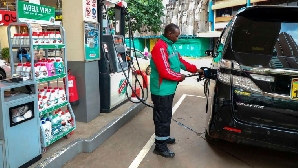 Pump attendant at the Rubis Petroleum Station in Nairobi County, Kenya serving Pump attendant at th
Pump attendant at the Rubis Petroleum Station in Nairobi County, Kenya serving Pump attendant at th
The Kenyan government has raided the pockets of fuel consumers once again after it tripled the tax payable to the Energy and Petroleum Regulatory Authority (Epra) for every litre of the commodity purchased.
The Ministry of Energy last week increased the Petroleum Regulatory Levy to Ksh0.75 per litre up from Ksh0.25.
The levy is one of nine taxes and levies that are charged on fuel and has been increased to fund the operations of the energy regulator.
The others are excise duty, Road Maintenance Levy, Petroleum Development Levy, Railway Development Levy, Anti-Adulteration Levy, Merchant Shipping Levy, Import Declaration Fee and Value Added Tax (VAT).
The increase of the levy last week went largely unnoticed because the energy regulator reduced the overall price of fuel by Ksh1 per litre.
Energy Cabinet Secretary Davis Chirchir last week published the Energy (Energy and Petroleum Regulatory Authority Petroleum Levy) Regulations, 2024 giving effect to the new charge.
“These regulations shall…come into operation on February 15, 2024,” said Mr Chirchir.
“The Energy Act (Petroleum Regulation Levy) Order, 2018 is revoked.”
This is the first time the levy is being reviewed in six years. The last review was done in June 2018 by then Petroleum Cabinet Secretary John Munyes. Before Mr Munyes’s review, the previous review had been done by Mr Chirchir in October 2014 when he served as the CS for Energy and Petroleum during the Jubilee government’s first term.
During that review, he raised the levy to Ksh0.12 per litre for petrol and diesel and Ksh0.05 per litre for kerosene.
The petroleum levy contributes 80.7 percent of Epra’s total revenue. The regulator made revenues amounting to Ksh1.51 billion in the year to June 2021, out of which Ksh1.21 billion came from the levy. Epra also generates revenue from a regulatory component contained in the electricity bill as well as revenue from licensing. During that year, Epra made Ksh236.69 million from the electricity levy.
Kenyans consumed 4.649 billion litres of fuel in 2023, according to data from Epra. This indicates that the regulator collected roughly Ksh1.16 billion levy.
Fuel price high
However, the increase in the petroleum levy means consumers will pay more at the pump even as fuel prices remain high.
Epra last week set prices of fuel at Ksh195.47 per litre of diesel and Ksh206.36 per litre of super petrol in Nairobi, down from Ksh196.47 and Ksh207.36 respectively. Fuel consumers could soon be hit with further price increases if proposals by the Kenya Roads Board (KRB) are approved.
KRB in its latest strategic plan proposes a Ksh5 a litre raise on Road Maintenance Fuel Levy (RMFL) arguing that the cost of maintaining roads in the country has shot up substantially from costlier fuel prices to the cost of key road construction materials including tar and bitumen and is expected to impact the cost of periodic road maintenance by road agencies in the 2023/24 fiscal year which commenced July 1.
The RFML is a tax collected at the fuel pump and is currently set at Ksh18 per litre of petrol and diesel with Ksh3 allocated to an annuity fund and the balance to road maintenance, rehabilitation, and development.
Road maintenance
The cost of periodic maintenance per kilometer by KeNHA is expected to move from Ksh3.94 million to Ksh6.06 million in the current financial year, according to data from KRB.
“There has been an increase in periodic maintenance cost by about 35 percent attributable to the uptake of roads with failed payments and increase in price construction materials mainly due to rise in fuel prices,” KRB noted in a summary of its 2023/24 annual public roads programme (APRP).
The State has over the years maintained the country’s road network through the Kenya Roads Board Fund (KRBF), which is mainly financed through the proceeds of the RMLF as well as transit tolls.
Records show that in the five years from 2018–2022, KRB spent Ksh309.74 billion on road maintenance, rehabilitation, and development programmes, excluding the Road Annuity Fund.
These amounts consisted of Ksh128.37billion to KeNHA, KeRRA (Ksh84.95billion), Kenya Urban Roads Authority (Kura) (Ksh35.24 billion), KWS (Ksh31.36billion), county governments (Ksh26.69billion) and a Ksh31.36billion allocation through the Transport cabinet secretary.